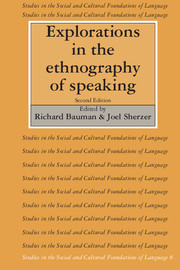Book contents
- Frontmatter
- Contents
- INTRODUCTION TO THE SECOND EDITION
- I PREFACE AND INTRODUCTION
- II COMMUNITIES AND RESOURCES FOR PERFORMANCE
- III COMMUNITY GROUND RULES FOR PERFORMANCE
- Introduction
- 4 Warm Springs ‘Indian Time’: How the Regulation of Participation Affects the Progress of Events
- 5 Contrapuntal Conversations in an Antiguan Village
- 6 Norm-Makers, Norm-Breakers: Uses of Speech by Men and Women in a Malagasy Community
- 7 Speaking in the Light: The Role of the Quaker Minister
- IV SPEECH ACTS, EVENTS, AND SITUATIONS
- V THE SHAPING OF ARTISTIC STRUCTURES IN PERFORMANCE
- VI TOWARD AN ETHNOLOGY OF SPEAKING
- Notes
- References
- Index of names
6 - Norm-Makers, Norm-Breakers: Uses of Speech by Men and Women in a Malagasy Community
Published online by Cambridge University Press: 05 June 2012
- Frontmatter
- Contents
- INTRODUCTION TO THE SECOND EDITION
- I PREFACE AND INTRODUCTION
- II COMMUNITIES AND RESOURCES FOR PERFORMANCE
- III COMMUNITY GROUND RULES FOR PERFORMANCE
- Introduction
- 4 Warm Springs ‘Indian Time’: How the Regulation of Participation Affects the Progress of Events
- 5 Contrapuntal Conversations in an Antiguan Village
- 6 Norm-Makers, Norm-Breakers: Uses of Speech by Men and Women in a Malagasy Community
- 7 Speaking in the Light: The Role of the Quaker Minister
- IV SPEECH ACTS, EVENTS, AND SITUATIONS
- V THE SHAPING OF ARTISTIC STRUCTURES IN PERFORMANCE
- VI TOWARD AN ETHNOLOGY OF SPEAKING
- Notes
- References
- Index of names
Summary
The community
Namoizamanga is a hamlet composed of twenty-four households, situated in the southern central plateau of Madagascar. This area is generally referred to as Vakinankaratra, meaning ‘broken by the Ankaratra.’ The Ankaratra Mountains do in fact form a natural boundary in the north. They separate this area somewhat from other parts of the central plateau area. This separation has sociological significance in that the people of this community and communities nearby identify themselves as Vakinankaratra. The present generation recognize an historical link with the dominant plateau group, the Merina, but choose a separate social identity.
A partial explanation for this parochialism lies in the nature of the ties which brought these people formerly in contact. In the late eighteenth century and into the nineteenth century, people of the Vakinankaratra were conquered by the Merina and brought north as slaves. When the French abolished ownership of slaves and the existence of a slave class (andevo), many slaves moved back into the traditional homeland of their ancestors. A villager speaks of this time with great difficulty and embarassment. The people know themselves to be former andevo and are known by others to be such, but the term itself is almost never used. To address or refer to someone as andevo is a grave insult. Genealogical reckoning is shallow, typically going back two to three generations. With some exceptions, local histories begin with the settling of ancestors into these villages in the early part of this century.
- Type
- Chapter
- Information
- Explorations in the Ethnography of Speaking , pp. 125 - 143Publisher: Cambridge University PressPrint publication year: 1989
- 24
- Cited by



